-
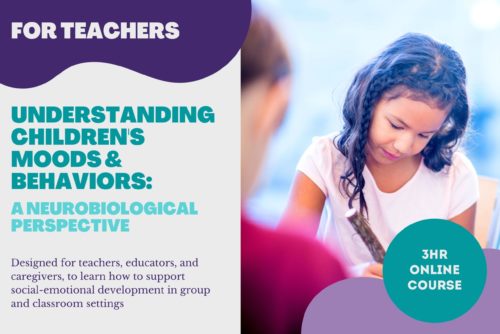 This is a therapist-designed course that assists teachers, early-childhood educators, and caregivers in learning how to support the nurturing of social-emotional development in a group and classroom setting. Looking for a fresh explanation on why children feel and act the way they do? Curious about the relationship between brain development and perception? Want to know how the nervous system lives up to its name? Learn this and more! Scroll down for course details and objectives.
This is a therapist-designed course that assists teachers, early-childhood educators, and caregivers in learning how to support the nurturing of social-emotional development in a group and classroom setting. Looking for a fresh explanation on why children feel and act the way they do? Curious about the relationship between brain development and perception? Want to know how the nervous system lives up to its name? Learn this and more! Scroll down for course details and objectives. -
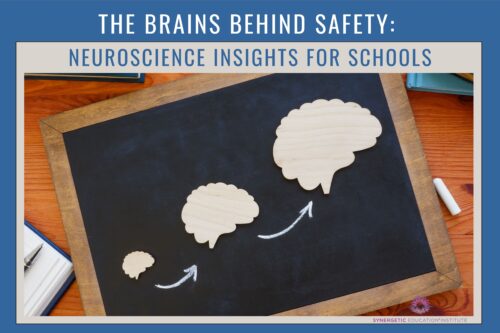 Join us for this 2-hour course as we explore how Safety and Belonging Start with the Brain! A felt sense of safety and belonging isn’t just nice to have—it’s essential for learning. While educators pour energy into creating welcoming spaces, students’ brains don’t always interpret experiences in those environments as safe. Fear-based behaviors can emerge even in classrooms that look warm and inviting. As school-based or clinical mental health professionals, we have a unique opportunity to bridge that gap. By helping educators understand how the brain perceives safety and threat, we can shift their approach and profoundly impact students' sense of security and connection. This course offers practical insights grounded in brain science to support student mental health and help every learner feel seen, safe, and ready to engage. What You'll Learn: ✔️How to create emotionally safe brain-aligned spaces that help students move through dysregulation and back to connection. ✔️Strategies to build trust and belonging within classrooms and across school communities, creating a foundation for thriving relationships. ✔️Tools to shift mindsets – empowering students and educators to approach challenges with curiosity instead of fear, promoting resilience and growth. Who Should Attend? This training is designed for school-based and clinical mental health professionals who support educators and students. Whether you work directly in schools or in private practice, you’ll leave with insights and tools you can use immediately to help educators bridge the gap between creating welcoming environments and cultivating felt safety and a sense of belonging. 💡 Join us and learn how to foster felt safety and belonging for both students and educators.
Join us for this 2-hour course as we explore how Safety and Belonging Start with the Brain! A felt sense of safety and belonging isn’t just nice to have—it’s essential for learning. While educators pour energy into creating welcoming spaces, students’ brains don’t always interpret experiences in those environments as safe. Fear-based behaviors can emerge even in classrooms that look warm and inviting. As school-based or clinical mental health professionals, we have a unique opportunity to bridge that gap. By helping educators understand how the brain perceives safety and threat, we can shift their approach and profoundly impact students' sense of security and connection. This course offers practical insights grounded in brain science to support student mental health and help every learner feel seen, safe, and ready to engage. What You'll Learn: ✔️How to create emotionally safe brain-aligned spaces that help students move through dysregulation and back to connection. ✔️Strategies to build trust and belonging within classrooms and across school communities, creating a foundation for thriving relationships. ✔️Tools to shift mindsets – empowering students and educators to approach challenges with curiosity instead of fear, promoting resilience and growth. Who Should Attend? This training is designed for school-based and clinical mental health professionals who support educators and students. Whether you work directly in schools or in private practice, you’ll leave with insights and tools you can use immediately to help educators bridge the gap between creating welcoming environments and cultivating felt safety and a sense of belonging. 💡 Join us and learn how to foster felt safety and belonging for both students and educators. -
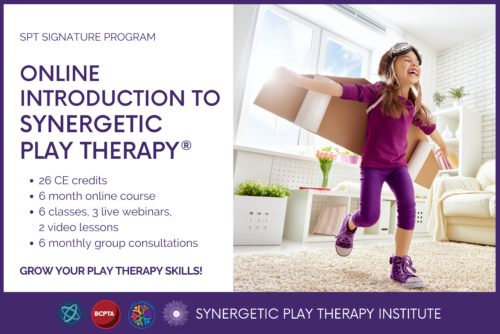
LEARN A SOLID PLAY THERAPY THEORY THAT COMBINES THE POWER OF PLAY WITH INTERPERSONAL NEUROBIOLOGY!
**For program details and dates of when this program is offered, please visit the Synergetic Play Therapy Institute's website**
CLICK HERE FOR MORE PROGRAM DETAILS!!
Have you been searching for ways to create a deeper impact for your clients? Or perhaps you are wanting to improve or learn more about ...- Becoming an external regulator to support children with integration and repatterning the activation of their nervous system.
- Supporting healing at deeper levels through right brain to right brain attuned communication.
- Teaching children interoceptive (body) awareness (...the key ingredient for self-regulation and co-regulation).
- Creating a neuroception of safety for a child when emotional flooding happens.
- Setting boundaries with the brain in mind to not minimize, shame or shut down the child's play, but keep them engaged in their therapy process.
- Building collaborative relationships with caregivers to support their child's therapeutic process.
- Developing goals, tracking a child's therapeutic process, and translating what's happening during the child's therapy session to their caregiver(s) and others in the world.
- Helping children develop a secure attachment to themselves (...a foundation of resilience).
- Applying SPT concepts from a cultural lens for a more inclusive and culturally sensitive clinical orientation where a client's unique experiences and needs are honored.
- How to feel a little more like YOU in the therapy process (...because we know inauthenticity is the fastest way to burnout and compassion fatigue).
Come discover what showing up in the playroom truly means and explore what is happening in the play therapy process, how change occurs, and ultimately what it takes to help children heal at profound levels. And the best part is, you get to be you on the journey!
Check out what past students had to say about their experiences in the course!
"SPT is the missing piece in play therapy. I gained an understanding of who I am in the playroom - a humanness that wasn't there before." -Frances Donohue
Join the growing number of mental health professionals, those in related roles (Child Life Specialists, School Counselors, Occupational Therapists, Coaches, etc.) and parents/caregivers who are learning SPT!
*For program details and objectives, see below.
-
 Keep the momentum going and continue growing and learning! Nurture the bonds you've built, with our 6-month group consultation journey designed for those who’ve completed one of our signature SEI programs. It’s a chance to deepen your learning, stay inspired, and grow together with our vibrant global community. Join Judy for six 1-hour group consultation sessions. This is your space to pause, reflect, and recharge. A place to reconnect with the heart of our work and the people who make it meaningful. Whether you're navigating challenges or celebrating wins, we want to walk alongside you. Use the dropdown menu to choose the group that fits your schedule the best. For dates and times, refer to the details below.
Keep the momentum going and continue growing and learning! Nurture the bonds you've built, with our 6-month group consultation journey designed for those who’ve completed one of our signature SEI programs. It’s a chance to deepen your learning, stay inspired, and grow together with our vibrant global community. Join Judy for six 1-hour group consultation sessions. This is your space to pause, reflect, and recharge. A place to reconnect with the heart of our work and the people who make it meaningful. Whether you're navigating challenges or celebrating wins, we want to walk alongside you. Use the dropdown menu to choose the group that fits your schedule the best. For dates and times, refer to the details below. -
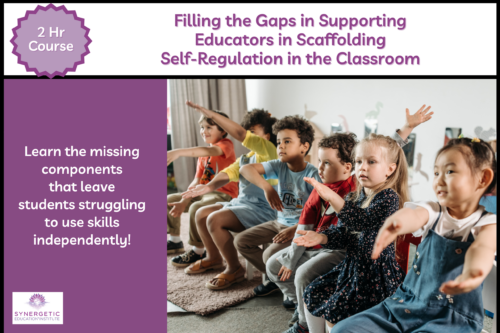
Join us for this 2-hour course as we identify and fill the gaps in supporting students and educators!
Educators are working harder than ever to teach social-emotional skills, yet many still feel frustrated when students struggle to apply what they've learned—especially when it comes to behavior and self-regulation. The reality? Most SEL programs are missing key components. Without the right scaffolding, students may understand self-regulation strategies in theory, but when big emotions hit, they can’t access or use them effectively. This can lead to a cycle of frustration for both educators and students. In this live, interactive training, we’ll uncover what’s missing and how mental health professionals can support educators in making simple but powerful shifts that integrate intentionally developing self-regulation skills daily in the classroom.
What You’ll Learn:
✔️ The hidden gaps in many SEL programs that prevent students from self-regulating.
✔️ How to scaffold self-regulation skills so students can apply strategies independently—even in moments of stress.
✔️ Small, practical shifts educators can make in their daily routines that lead to lasting behavior change.
Who Should Attend? This training is designed for school-based and clinical mental health professionals who support educators and students. Whether you work directly in schools or in private practice, you’ll leave with insights and tools you can use immediately to help educators bridge the gap between teaching self-regulation and students actually using it when they need it most.
💡 Join us and learn how to make self-regulation easier—not harder—for both students and educators.
-
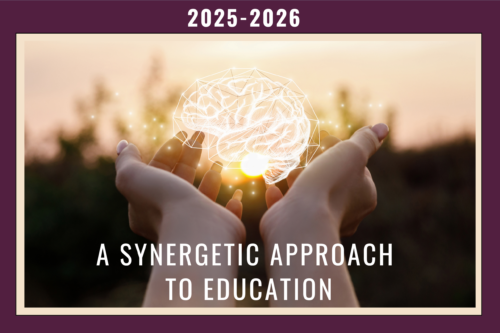 Use Early Bird Coupon Code “EarlyBird50” for $50 USD off until October 1st!
Use Early Bird Coupon Code “EarlyBird50” for $50 USD off until October 1st!Registration Deadline is October 28, 2025, 12pm MST
Are you a school-based mental health professional questioning how to truly support students struggling with challenging behaviors? Or maybe, you’re finding yourself stuck between educational demands and the real needs of your students? Or perhaps you’re trained in Synergetic Play Therapy and looking for ways to bring your SPT skills into schools or educational settings to make a deeper impact? A Synergetic Approach to Education is here to bridge that gap, offering you practical, neuroscience-backed strategies that are not just “another thing on your or others’ plates,” but tools to transform your approach to classroom regulation and student engagement. How Is This Different from Other Programs? Unlike traditional educational programs that often overlook the link between mental health and classroom dynamics, our approach integrates decades of experience working at the intersection of education and mental health. This isn’t just about adding new techniques—it’s about fundamentally reshaping how you understand and respond to student behaviors. You’ll learn to implement small but powerful shifts in daily routines that prepare brains and bodies to learn, helping educators see beyond surface-level behaviors to the neurophysiological states driving them. What Does This Have to Do with SPT? Rooted in Synergetic Play Therapy principles, this program extends the insights of SPT into the classroom, giving you what you need to empower educators to become external regulators who support students in real time. You’ll discover how to translate the SPT model’s emphasis on regulation, curiosity, and connection into practical strategies that fit naturally into classroom settings. Our unique lens helps educators see their own roles in student dynamics, fostering environments of safety, belonging, and co-regulation that elevate everyone. What Will You Learn That Makes Us Different?- Identify Missing Pieces in School Programs: Discover critical components often absent from current school approaches that keep students stuck in challenging behaviors and learn how to explicitly teach educators how to prepare brains and bodies to learn with “top-down” and “bottom-up” approaches.
- Model Classroom-Wide Regulation: Learn how to demonstrate regulation strategies that benefit all students and teachers, without adding extra workload.
- Understand Underlying Issues: Help educators recognize the deeper dynamics affecting classroom behaviors in ways that make sense to them, making their interventions more effective and sustainable.
- Tailor Supports to Educators' Realities: Establish practical approaches that account for differing student needs while ensuring educators can implement them seamlessly in their classrooms.
- Address Barriers with Curiosity: Tackle common challenges educators face and empower them to engage with these difficulties using a mindset of curiosity rather than resistance.
- Prepare Brains and Bodies to Learn: Gain tools to articulate the connection between neurophysiological states and behaviors, equipping educators to support students more effectively.
- Practical, Scalable Strategies: Implement classroom-wide regulation that supports every student and doesn’t feel like “one more thing.”
- Deeper Understanding of Behavior Dynamics: Uncover the root causes of challenging student behaviors and learn how to guide educators in addressing them.
- Empowerment to Transform Classrooms: Use the principles of SPT to create regulatory environments that allow for dynamic, individualized support.
- Collaboration and Connection: Model how to balance support and challenge, cultivating resilience in educators and students alike.
Program Prerequisites: This program requires that you have taken a Level 1 Introduction to Synergetic Play Therapy® program. This includes the completion of one of the following:- Online or In-Person Introduction to Synergetic Play Therapy® program
- Six-Day Synergetic Play Therapy® Intensive Training (no longer offered)
- Synergetic Play Therapy® Supplemental Course (no longer offered)

